NCERT Summary: Components of Food | Class 6 All Subjects (Old NCERT) PDF Download
What are Nutrients?
- The food that we eat consists of different components.
- The components of food which are needed by our body are known as nutrients.
- There are six main components present in food: Carbohydrates, fats, proteins, vitamins, minerals and fibres.
- These components fulfil the different needs of the body.
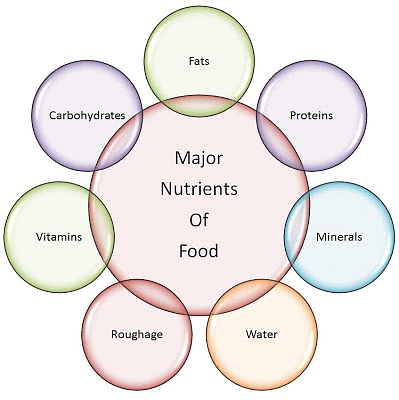
Carbohydrates
Carbohydrates are a type of nutrient that provide energy to the body. They are primarily found in foods like grains, fruits, and vegetables.
- Carbohydrates are one of the major nutrients found in food, along with proteins, fats, vitamins, and minerals. Dietary fibres and water are also essential.
- Carbohydrates are mainly classified into:
Starches: Complex carbohydrates found in foods like potatoes and rice.
Sugars: Simple carbohydrates found in foods like fruits and sweets. Tests can determine if these are present in food items.
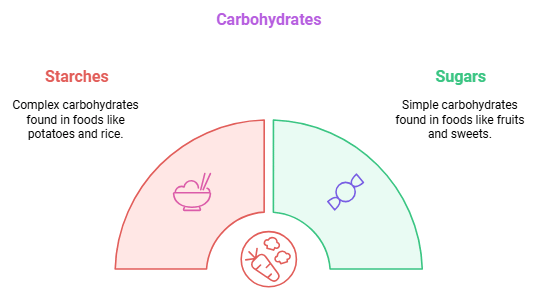
Test for Starch:
Step 1: Take the food item in the test tube and add 2-3 drops of dilute iodine solution to it.
Step 2: After some time if the colour changes to blue-black, it indicates the presence of starch in the food item.
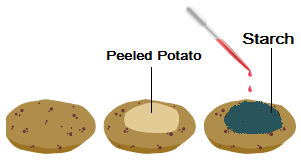
Proteins
Proteins are important nutrients found in many foods. They help build and repair body tissues, like muscles and organs. Foods like meat, eggs, beans, and nuts are rich in proteins. They are essential for growth and good health.
Test for proteins
Step 1: Take food item in the test tube and add 10 drops of water to it and mix well.
Step 2: Now add 2 drops of copper sulphate and 10 drops of caustic soda (sodium hydroxide) solution.
Step 3: Mix it well and keep it undisturbed for some time.
Step 4: After some time you observe the development of violet colour in the test tube, it indicates the presence of the proteins.
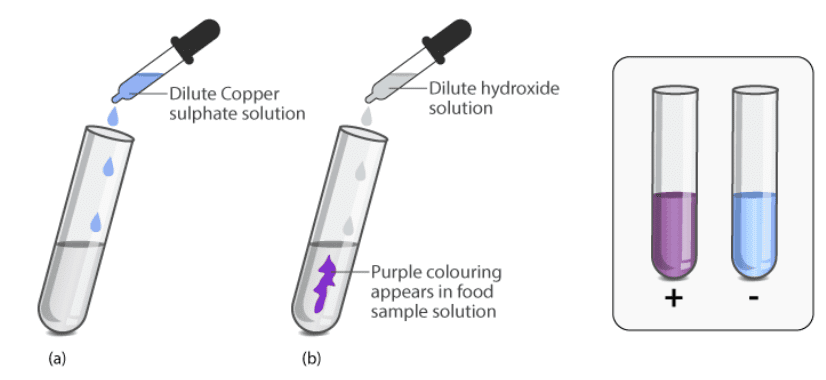
Fat
Fats provide energy to our body and help in the absorption of certain vitamins.Fat gives more energy as compared to carbohydrates. Some sources of fat are oil, ghee, egg yolk, milk, butter etc.
Test for fats:
Step 1: Take some food item in a paper and wrap it.
Step 2: Then try to crush it taking care that the paper is not torn.
Step 3: After that take out the food item and allow the paper to be dried for some time.
Step 4: If you can find the oil spots on the paper it indicates the presence of fats in the food item.
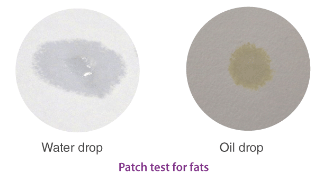
Vitamins
- Vitamins are essential for protecting the body from diseases and maintaining the health of eyes, bones, teeth, and gums.
- There are different types of vitamins, including Vitamin A, Vitamin C, Vitamin D, Vitamin E, Vitamin K, and the Vitamin B-complex group.
- The body needs all vitamins in small amounts:
Vitamin A:
- Role: Keeps skin and eyes healthy.
- Sources: Liver, guava, amla, carrots.
Vitamin C:
- Role: Helps the body fight against diseases.
- Sources: Guava, lemon, oranges, papaya.
Vitamin D:
- Role: Helps the body use calcium for strong bones and teeth.
- Sources: Fish, liver, egg, and exposure to sunlight.
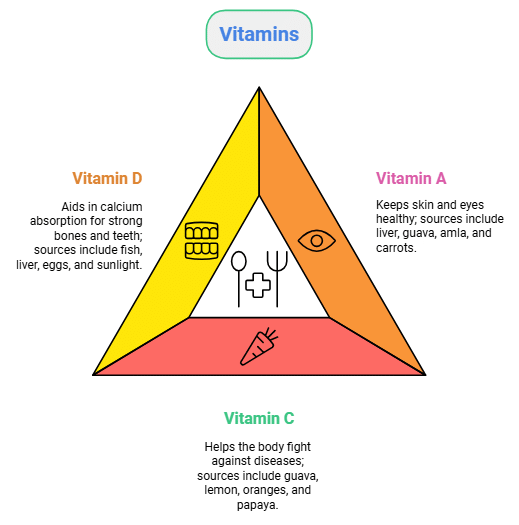
Minerals
- Minerals are needed by the body in small amounts but are essential for proper growth and health.
- Each mineral plays a specific role in maintaining good health.
- Most foods contain multiple nutrients.
- Some foods are particularly rich in one type of nutrient; for example, rice is a carbohydrate-rich source.
Calcium:
- Function: Essential for strong bones and teeth. It also plays a key role in muscle function, nerve signaling, and blood clotting.
- Sources: Found in dairy products like milk and cheese, as well as in leafy green vegetables like spinach.
Iron:
- Function: Crucial for the formation of hemoglobin in red blood cells, which helps transport oxygen throughout the body. Iron also supports energy metabolism and immune function.
- Sources: Found in meats, such as beef and chicken, and plant sources like spinach and legumes.
Phosphorous:
- Function: Important for the formation of bones and teeth, and it also helps in energy production and storage. Phosphorous works with calcium to build and maintain strong bones and teeth.
- Sources: Commonly found in dairy products, meat, and whole grains.
Iodine:
- Function: Necessary for the production of thyroid hormones, which regulate metabolism, growth, and development. Adequate iodine is essential for normal thyroid function.
- Sources: Present in iodized salt and seafood like fish and seaweed.
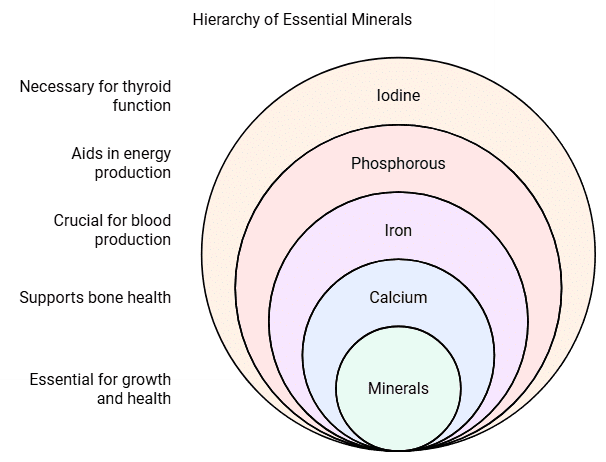
Roughage
- Dietary fibres, also known as roughage, are essential for our body.
- Roughage is primarily provided by plant products in our diet.
- Main sources include whole grains, pulses, potatoes, fresh fruits, and vegetables.
- While roughage does not provide nutrients, it is crucial for adding bulk to food.
- This bulk helps the body eliminate undigested food efficiently.
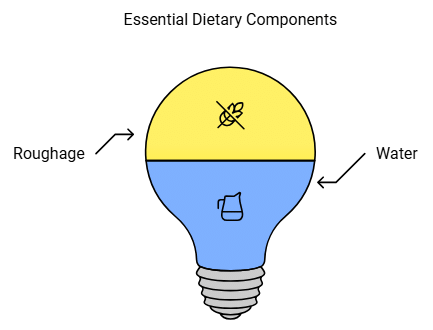
Water
- Water aids in absorbing nutrients from food and helps eliminate wastes through urine and sweat.
- Most water intake comes from liquids like water, milk, and tea.
- Water is also added to cooked foods.
- Many fruits and vegetables contain inherent water.
- For instance, cutting a tomato or lemon releases water, indicating their water content.
Balanced Diet
- Our diet should have all the required nutrients in right proportions this should also contain some water and dietary fibers this kind of diet is called as Balanced diet.
- Balanced diet provides all essential nutrients in the right quantities for growth and health, including adequate roughage and water.
- Dietary needs vary by age and physical activity level, so adjustments should be made accordingly.
- Tracking weekly food intake can help ensure all necessary nutrients are consumed.
- Foods like pulses, groundnuts, soybeans, sprouted seeds, fermented foods, and fruits can provide a balanced diet without expensive items.
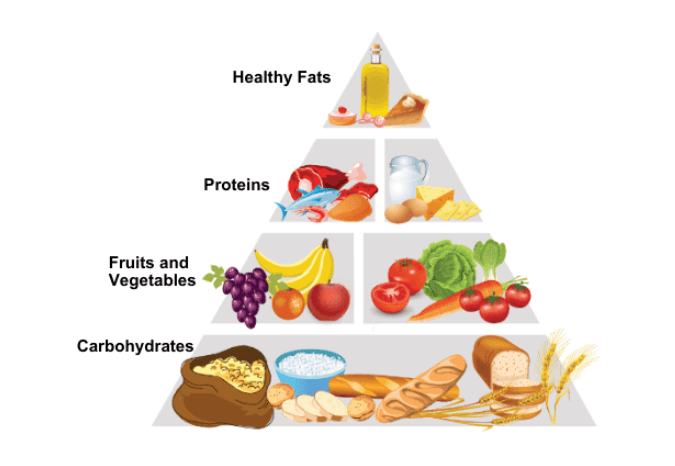
- Proper cooking is important to retain nutrients, but some are lost during cooking.
- Washing vegetables and fruits after peeling can result in the loss of some vitamins; the skins often contain nutrients.
- Repeated washing of rice and pulses may remove vitamins and minerals.
- Excess water used during cooking can lead to the loss of proteins and minerals.
- Vitamin C is particularly sensitive to heat and can be destroyed during cooking.
- Including some raw fruits and vegetables helps preserve nutrients.
- Consuming too much fat, such as in fried foods and sweets, can be harmful and lead to obesity.
Deficiency Diseases
- Diseases that occur due to lack of nutrients over a long period are called as deficiency diseases.
- If we do not take a particular nutrient over a long period of time, we suffer from its deficiency.
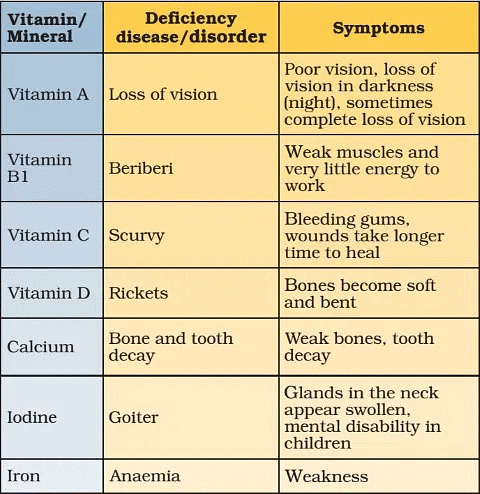
|
297 videos|1066 docs|204 tests
|
FAQs on NCERT Summary: Components of Food - Class 6 All Subjects (Old NCERT)
| 1. भोजन के मुख्य घटक कौन-कौन से हैं? |  |
| 2. कार्बोहाइड्रेट का क्या महत्व है? |  |
| 3. प्रोटीन हमें क्यों चाहिए? |  |
| 4. विटामिन्स का भोजन में क्या कार्य है? |  |
| 5. संतुलित आहार क्या है? |  |






















